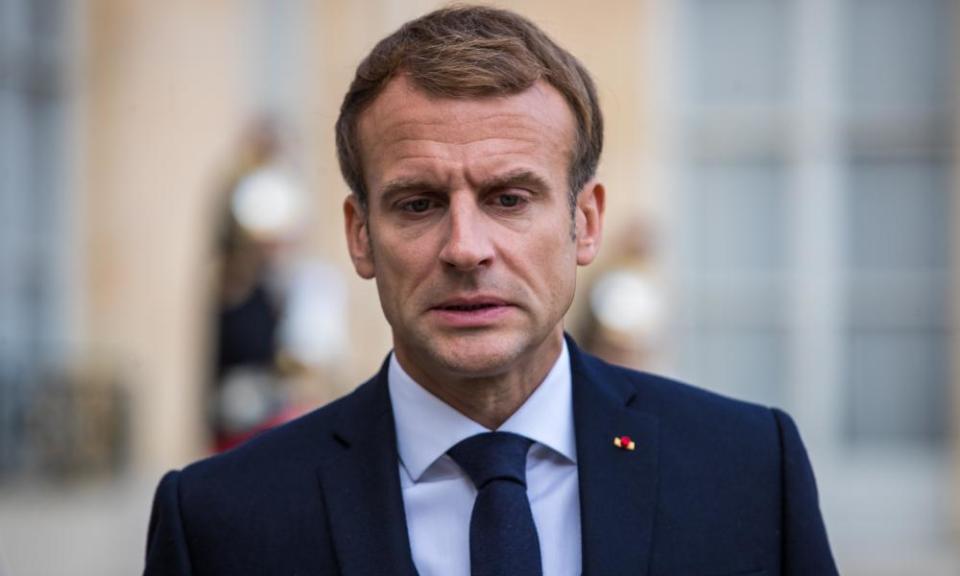Perfidious Albion: why French faith in Boris Johnson has nosedived

Boris Johnson’s foreign policy is 80% driven by short-term domestic political interests that make it impossible to come to stable arrangements with him, senior French sources have concluded.
Paris is increasingly convinced the British prime minister is not interested in solving the bilateral problems weighing down the relationship, and instead wants to use France as a running sore to keep Brexit alive in British politics.
The complaint is in some ways a mirror-image of the British claim that French attitudes are being driven by internal politics.
One diplomat described the situation as perilous, saying Britain seems uninterested in improving relations until after the French presidential election next April, leaving eight difficult months ahead in which the relationship could decline further on a variety of fronts.
It is expected that the French president, Emmanuel Macron, will appoint his combative Europe minister, Clément Beaune, as a key figure in his campaign team. Beaune has described the UK as being obsessed with France, and threatened to reduce energy supplies to the UK if it did not relent over French fishing rights in the Channel Islands. The threat has not been repeated by the French prime minister, Jean Castex, but France is among a list of countries pressing for trade reprisals if talks on the Northern Ireland Protocol spiral out of control.
Technical discussions are under way at an official level on French cooperation in addressing migrants crossing the Channel and the vexed issue of French fishing rights, but other flashpoints remain, not least the UK’s role in catching Paris by surprise with the Aukus defence pact that caused France to lose a valuable contract to supply Australia with submarines. A cancelled meeting between British and French defence ministers has not yet been rescheduled.
France has noted that the US president, Joe Biden, made substantive concessions in the after the Aukus furore and assured Macron that similar discourtesy would not be repeated, but Johnson made no comparable proposals in his make-up call and instead promoted Adm Sir Tony Radakin, the British official most intimately involved in breaking up the French submarine contract, to chief of the defence staff.
France is also concerned that the US decision to share the secrets of its nuclear submarine propulsion with Australia may provoke similar decisions and increase the risk of nuclear proliferation in the Indo-Pacific region. South Korea and India are both seen as aspirants to own nuclear-powered attack submarines.
France believes it has US approval to press for a stronger European role within Nato.
A difficulty, in French eyes, is that Johnson is not a normal politician, but a populist rarely across the detail who is incapable of keeping his word if it will cost him domestically and who is only likely to change his style if the polls start to move against him.
Diplomats claim that Johnson allows phone calls to deflect quickly from discussions on a joint UK-French roadmap to a closer strategic relationship to complaints about small boats, a reference to French fishers off Jersey. “The instability is that some have concluded that Johnson and Lord Frost [the Brexit minister] do not want agreements on the Northern Ireland protocol, or anything much, but will continue ramping up demands until they are impossible,” a French source said.
An imminent test will be the payment of the £54m promised by the UK in June to help cover the cost of policing migrants crossing the Channel. Last weekend, the French interior minister, Gérald Darmanin, complained “not one euro has been paid”, adding sarcastically that it must be due to an accounting error. France claims that more than a quarter of its budget for borders is spent on policing the Channel.
Darmanin also called, under domestic pressure, for a renegotiation of the Le Touquet treaty signed in 2003 – under which the UK border was moved to France – which is a near-universal demand on the French right. He pointed out that he had received no reply from the British since he made the request in the summer and vowed to make the issue a priority in the French presidency in the first six months of next year.
The political pressure to take this tough line is intensifying. At the weekend, the Calais mayor, Natacha Bouchart, described the British as “cynical, sarcastic and unable to reform their own labour laws even though they in fact largely promote illegal work and reinforce the pull factor”. It is estimated that 7,000 migrants have crossed the Channel in 2021, double the number who crossed the previous year.
France has also rallied the support of 11 EU maritime nations to demand that the UK honour the spirit and letter of the 2019 withdrawal agreement on fishing rights. Their joint statement claims that British demands that boats smaller than 12 metres produce GPS records to show whether they have previously fished in its waters is impossible and outside the agreement. Reprisals are due to be announced in the next week, the French have vowed.
Jersey announced last month that it had granted 64 definitive licences to French vessels and 31 temporary ones – compared with 169 requested by Paris – and rejected 75 applications. The day before, London granted 12 additional authorisations in its waters, within the limit of six to 12 nautical miles of its coasts – less than a quarter of the 87 requested by France. Jersey’s external affairs minister, senator Ian Gorst, claimed that “bureaucratic blockages” may be responsible for the delay, adding that logbooks would be sufficient evidence.
Any EU-registered vessels applying to fish locally must prove they operated in Jersey waters for at least 10 days in 2017, 2018 or 2019.

 Yahoo Finance
Yahoo Finance 